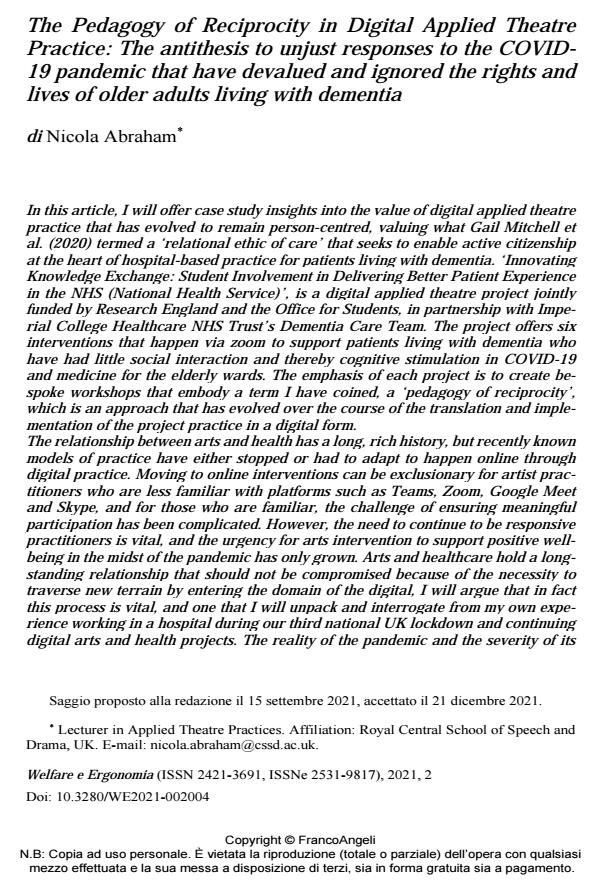The Pedagogy of Reciprocity in Digital Applied Theatre Practice: The antithesis to unjust responses to the COVID-19 pandemic that have devalued and ignored the rights and lives of older adults living with dementia
Journal title WELFARE E ERGONOMIA
Author/s Nicola Abraham
Publishing Year 2022 Issue 2021/2
Language English Pages 15 P. 49-63 File size 190 KB
DOI 10.3280/WE2021-002004
DOI is like a bar code for intellectual property: to have more infomation
click here
Below, you can see the article first page
If you want to buy this article in PDF format, you can do it, following the instructions to buy download credits

FrancoAngeli is member of Publishers International Linking Association, Inc (PILA), a not-for-profit association which run the CrossRef service enabling links to and from online scholarly content.
In this article, I will offer case study insights into the value of digital applied theatre practice that has evolved to remain person-centred, valuing what Gail Mitchell et al. (2020) termed a ‘relational ethic of care’ that seeks to enable active citizenship at the heart of hospital-based practice for patients living with dementia. ‘Innovating Knowledge Exchange: Student Involvement in Delivering Better Patient Experience in the NHS (National Health Service)’, is a digital applied theatre project jointly funded by Research England and the Office for Students, in partnership with Imperial College Healthcare NHS Trust’s Dementia Care Team. The project offers six interventions that happen via zoom to support patients living with dementia who have had little social interaction and thereby cognitive stimulation in COVID-19 and medicine for the elderly wards. The emphasis of each project is to create bespoke workshops that embody a term I have coined, a ‘pedagogy of reciprocity’, which is an approach that has evolved over the course of the translation and implementation of the project practice in a digital form. The relationship between arts and health has a long, rich history, but recently known models of practice have either stopped or had to adapt to happen online through digital practice. Moving to online interventions can be exclusionary for artist practitioners who are less familiar with platforms such as Teams, Zoom, Google Meet and Skype, and for those who are familiar, the challenge of ensuring meaningful participation has been complicated. However, the need to continue to be responsive practitioners is vital, and the urgency for arts intervention to support positive wellbeing in the midst of the pandemic has only grown. Arts and healthcare hold a long-standing relationship that should not be compromised because of the necessity to traverse new terrain by entering the domain of the digital, I will argue that in fact this process is vital, and one that I will unpack and interrogate from my own experience working in a hospital during our third national UK lockdown and continuing digital arts and health projects. The reality of the pandemic and the severity of its impact on the mental health and wellbeing of older adults is profound. The International Psychogeriatric Association have discussed the ongoing impact on the mental health and wellbeing of older adults forced to socially isolate. This circumstance is unavoidable for the prevention of the spread of COVID-19, but the fear of contracting COVID-19, or not receiving hospital treatment for particular age brackets, and the impact of not being able to socialise with family and friends is causing a rise in suicide, anxiety, agitation and loneliness. Myrra Vernooij-Dassen (2020) argues that social, mental and cognitive health are not considered by policy makers, and the impact of a lack of social health for people living with dementia is particularly detrimental causing conditions to rapidly deteriorate without social interactions. In this article, I will set out the conceptual framework for the pedagogy of reciprocity as a methodology for responsive digital applied theatre practice that has emerged directly from my experience running projects in the pandemic in acute hospital settings.
Keywords: Applied Theatre; Dementia; COVID-19; Pedagogy of Reciprocity.
- Conquering the Zoombies Eva Göksel, Nicola Abraham, in Scenario: A Journal of Performative Teaching, Learning, Research /2022 pp.93
DOI: 10.33178/scenario.16.2.6 - Effectiveness of Drama-Based Intervention in Improving Mental Health and Well-Being: A Systematic Review and Meta-Analysis during the COVID-19 Pandemic and Post-Pandemic Period Lulu Jiang, Farideh Alizadeh, Wenjing Cui, in Healthcare /2023 pp.839
DOI: 10.3390/healthcare11060839
Nicola Abraham, The Pedagogy of Reciprocity in Digital Applied Theatre Practice: The antithesis to unjust responses to the COVID-19 pandemic that have devalued and ignored the rights and lives of older adults living with dementia in "WELFARE E ERGONOMIA" 2/2021, pp 49-63, DOI: 10.3280/WE2021-002004